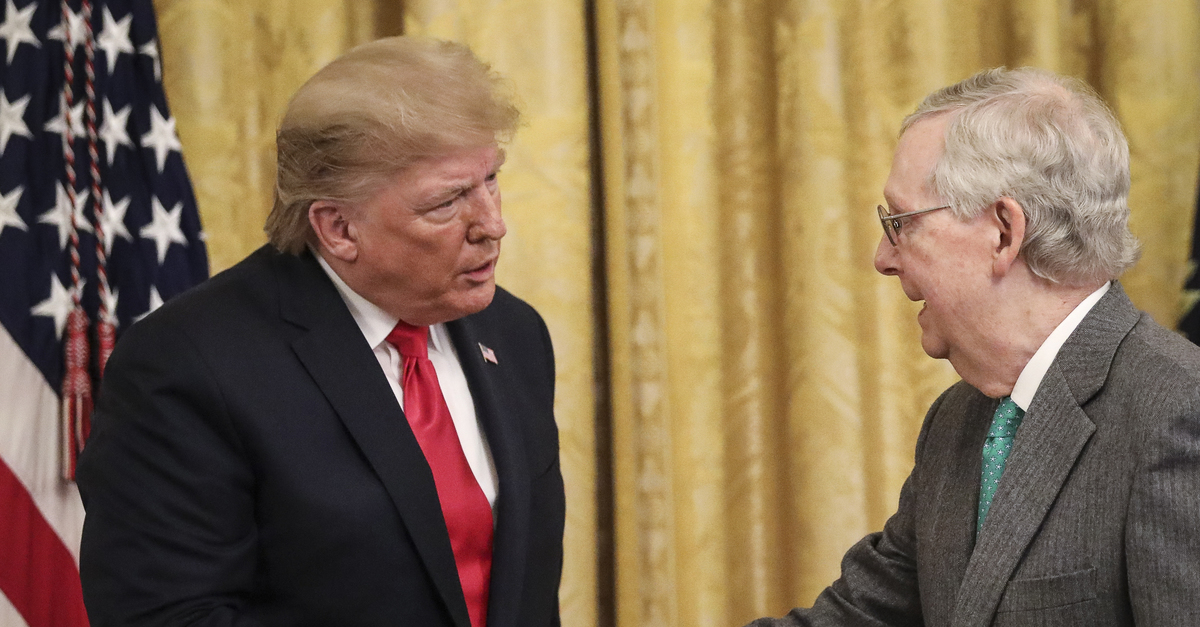
Just hours after the death of Supreme Court Justice Ruth Bader Ginsburg on Friday evening, Senate Majority Leader Mitch McConnell (R-Ky.) urged his colleagues not to “prematurely lock” themselves into a position on filling her seat. He also promised that he would put any nominee up for a vote before November. The prospect of Republicans appointing a third justice to the high court barely a month ahead of the presidential election—particularly in light of a prior refusal to consider Merrick Garland’s 2016 nomination—almost immediately sparked talks of a potential Biden administration retaliating by packing the court.
“Americans reelected our majority in 2016 and expanded it in 2018 because we pledged to work with President [Donald] Trump and support his agenda, particularly his outstanding appointments to the federal judiciary,” McConnell said Friday. “President Trump’s nominee will receive a vote on the floor of the United States Senate.”
McConnell’s position was reiterated by Sen. Ted Cruz (R-Texas), whose name was included on President Trump’s recent shortlist of potential Supreme Court nominees. Cruz said it was “critical” that the Senate confirm a replacement for Ginsburg before the election, saying it was “why Donald Trump was elected.” Cruz (and a number of other Republican senators) said in 2016 said there was a “long tradition” of not confirming justices in an election year.
All of this has led to swift backlash, reinvigorating predictions that Democrats may take the radical step of packing the courts – meaning add more justices to the Supreme Court. While the court has been locked at nine members since 1869, the U.S. Constitution does not mandate that any particular number of justices sit on the court.
Though Democratic presidential nominee Joe Biden last year said he was “not prepared to go on and try to pack the court, because we’ll live to rue that day,” the current circumstances may have already rendered that position untenable.
“If McConnell, Graham, and the other GOP Senators replace RBG in the weeks before this election or in a lame duck session, I think it will radicalize moderates (who don’t like to treat the Court like a political football) into supporting Court packing,” wrote University of North Carolina law professor Carissa Byrne Hessick.
“Yep,” responded Loyola University Chicago law professor Sam Brunson. “If there’s a confirmation I don’t see how a Biden administration doesn’t at least threaten to pack the Court and, if that doesn’t lead to retirements, doesn’t follow through.”
The predictions were quickly vindicated. Attorney Mondaire Jones, the Democratic House nominee for New York’s 17th District, said that if Republicans confirm a new justice, Democrats “must” add additional justices to the bench.
“Let’s not mince words. Under no circumstance should Donald Trump and Mitch McConnell replace RBG with a partisan right-wing Justice,” he tweeted. “But if they do, the next Congress absolutely must expand the Supreme Court.”
Sen. Ed Markey (D-Mass.) reiterated the same call to action.
“Mitch McConnell set the precedent. No Supreme Court vacancies filled in an election year,” he wrote. “If he violates it, when Democrats control the Senate in the next Congress, we must abolish the filibuster and expand the Supreme Court.”
Democratic Sens. Brian Schatz (D-Hawaii) and Chris Murphy (D-Ct.) didn’t go so far as to promise packing the courts, but both made ominous statements about what may follow if Republicans confirmed a new justice.
https://twitter.com/ChrisMurphyCT/status/1307134160918712320
Adding fuel to the fire on the morning after Ginsburg’s passing, President Trump encouraged Republicans to consider—“without delay”— his likely soon-to-be announced nominee.
Democrats had already hinted that the drastic measure of packing the court was on the table. Former vice presidential candidate Sen. Tim Kaine (D-Va.) said last month that if Democrats take the Senate in November, the addition of justices would be “a statutory option that we have that’s fully constitutional in our availability.”
Republicans may try to draw a distinction between the current scenario and the Merrick Garland precedent. In 2016, the Senate was controlled by Republicans and then-President Barack Obama, a Democrat, nominated Garland in an election year. Now, both the Senate and the presidency are controlled by Republicans.
[image via Drew Angerer/Getty Images]